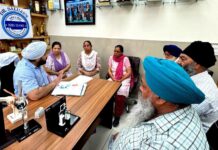Kisan Kavach
Bharat’s First Anti-Pesticide Bodysuit
doc20241220475001“Kisan Kavach is not just a product but a promise to our farmers to safeguard their health as they continue to feed the nation”
~Union Minister Dr. Jitendra Singh
Introduction
Preetam Singh, a farmer from Panipat, Haryana, like many others, had raised concerns about the harmful effects of pesticides. While pesticides are crucial for protecting crops from pests and diseases, they also pose significant health risks to those who handle them. Concerned about these dangers, Preetam reached out to pesticide companies for a solution. His concerns were addressed with the launch of Kisan Kavach, a protective suit designed to safeguard farmers. Now, with Kisan Kavach, Preetam and others can apply pesticides with confidence, knowing their health is protected.
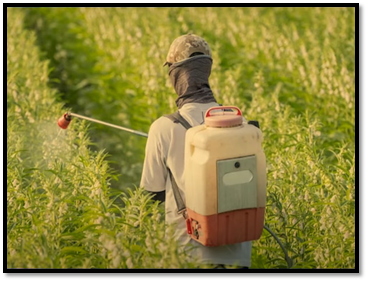
Kisan Kavach: Unveiling the Safety Shield[1]
On 17th December, Union Minister Dr. Jitendra Singh unveiled Kisan Kavach, Bharat’s first anti-pesticide bodysuit, designed to protect farmers from the harmful effects of pesticide exposure. This groundbreaking innovation is a major step forward in ensuring farmer safety and empowers the agricultural community through science and technology. The event also marked the distribution of the first batch of Kisan Kavach suits to farmers, emphasizing the importance of safeguarding farmers.
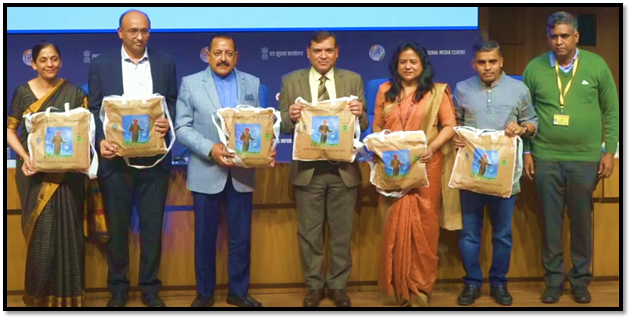
Using Innovation to Safeguard Farmers’ Health
Kisan Kavach is an innovative solution designed to address a critical safety concern for farmers. Developed by BRIC-inStem in Bangalore, in collaboration with Sepio Health Pvt. Ltd., this bodysuit provides essential protection against pesticide-induced toxicity. The Kisan Kavach Protective Shield includes a full-body suit, mask, headshield, and gloves, offering comprehensive protection.
Priced at ₹4,000, the suit is washable, reusable, and can last up to two years with up to 150 washes. The suit features advanced fabric technology that deactivates harmful pesticides upon contact, ensuring maximum safety for farmers. The fabric works through a process where a nucleophile is covalently attached to cotton fibres, allowing it to neutralize pesticides via nucleophilic-mediated hydrolysis. This groundbreaking technology, detailed in the journal Nature Communications, makes Kisan Kavach a game-changer in safeguarding farmers. The government aims to reduce the cost over time to make it more accessible to a wider audience.
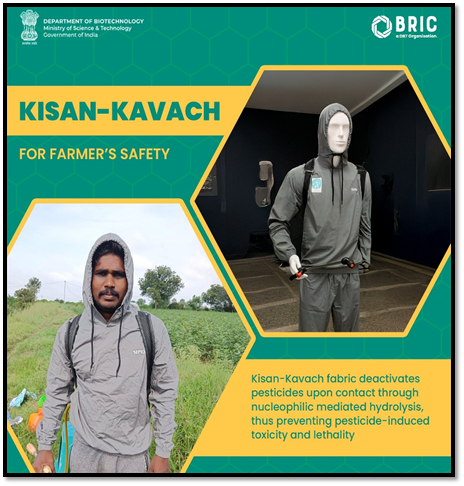
Pesticides: A Double-Edged Sword[2]
- Need for Pesticides
With shrinking land, low productivity, and a declining farming workforce, agricultural output must increase to meet growing food demands. Crop pests and pathogens cause 15–25% yield loss in major crops. Therefore, pesticides are essential to address these challenges.
- Adverse Impacts of Pesticides
When improperly used, pesticides pose significant risks to both the environment and human health. During spraying, especially when mixing pesticides, the risk of exposure is higher, as pesticides can enter the body through the skin, eyes, mouth, or lungs. Skin contact is particularly dangerous, as certain body parts absorb pesticides rapidly, making protective gear essential. Between 2015 and 2018, misuse of pesticides, over-application, and lack of proper safety measures resulted in 442 fatalities.[3]
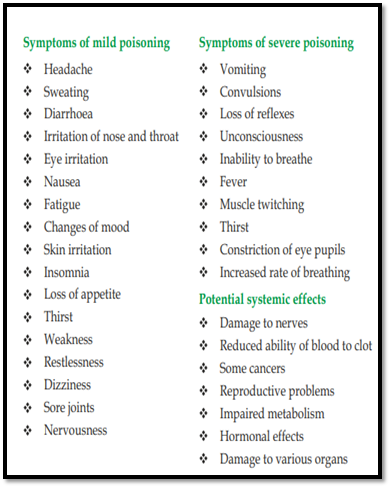
Reducing Pesticide Usage: Key Government Strategies
The severity of pesticide-related risks became evident in 1958, when a mass methyl parathion poisoning in Kerala led to the enforcement of the Insecticides Act, 1968 and Insecticide Rules, 1971. These laws aimed to regulate the import, manufacture, sale, and use of insecticides to protect human and animal health. Key provisions included mandatory product registration, licenses for manufacturing and sale, and the creation of the Central Insecticides Board (CIB) for technical guidance. The government was also empowered to ban harmful pesticides and impose penalties for violations.
- Good Agricultural Practices (GAP): Good Agricultural Practices (GAP) focus on sustainability across environmental, economic, and social aspects of farming, ensuring safe and quality agricultural products. GAP covers four key pillars: economic viability, environmental sustainability, social acceptability, and food safety and quality.
Objectives of GAP:
- Ensure food safety and product quality.
- Unlock new market opportunities by improving supply chain practices.
- Enhance the use of natural resources, improve worker health, and create better working conditions, benefiting farmers and exporters, especially in developing countries.
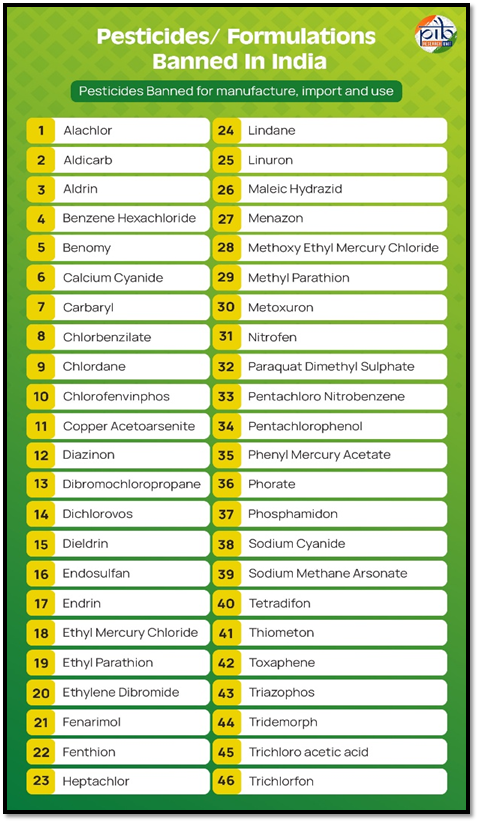
Promoting Usage of Bio-pesticides
To effectively reduce pesticide use, it is essential not only to strengthen laws but also to promote sustainable farming practices. The government recognizes the importance of chemical-free farming and has introduced several initiatives to encourage using biopesticides and organic farming.
Promotion of Biopesticides: [4]
- The Central Insecticide Board & Registration Committee (CIB&RC) has simplified the guidelines for registering biopesticides, making it easier compared to chemical pesticides.
- Provisional registration under The Insecticides Act, 1968 allows the commercialization of biopesticides, unlike chemical pesticides.
Types of Biopesticides: [5]
- Biopesticides like Bacillus thuringiensis, Trichoderma, Pseudomonas, Metarhizium, Beauveria, and others play a crucial role in sustainable crop protection.
- In India, around 20 microorganisms are registered as biopesticides, categorized into fungi, bacteria, and viruses.
Integrated Pest Management (IPM):
IPM is an ecological approach aimed at controlling pest populations using sustainable methods such as preventive measures, cultural practices, mechanical control, and biological control. Emphasis is placed on using bio-pesticides and plant-origin pesticides like neem formulations.
The government is taking significant steps to reduce pesticide use, promote organic farming, and enhance the sustainability of agricultural practices in India. As a result of these efforts, the consumption of chemical pesticides has also decreased, supporting a shift towards more sustainable agricultural practices.
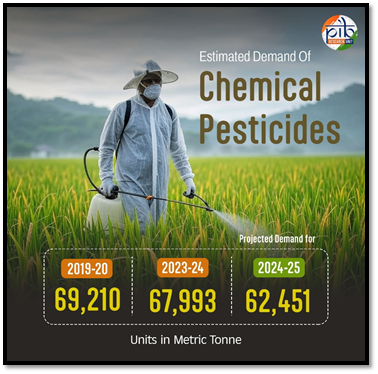
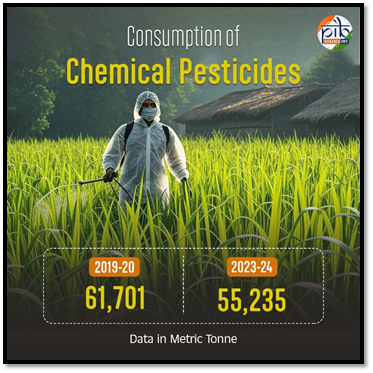
Conclusion
The launch of Kisan Kavach marks a significant advancement in protecting farmers from the harmful effects of pesticide exposure. This innovative suit, equipped with advanced fabric technology, plays a crucial role in enhancing farmer safety. Alongside this initiative, the government is actively working to reduce the use of chemical pesticides while promoting the adoption of biopesticides. These efforts align with India’s commitment to creating a safer and more sustainable agricultural future, ensuring both the health of farmers and the environment.



